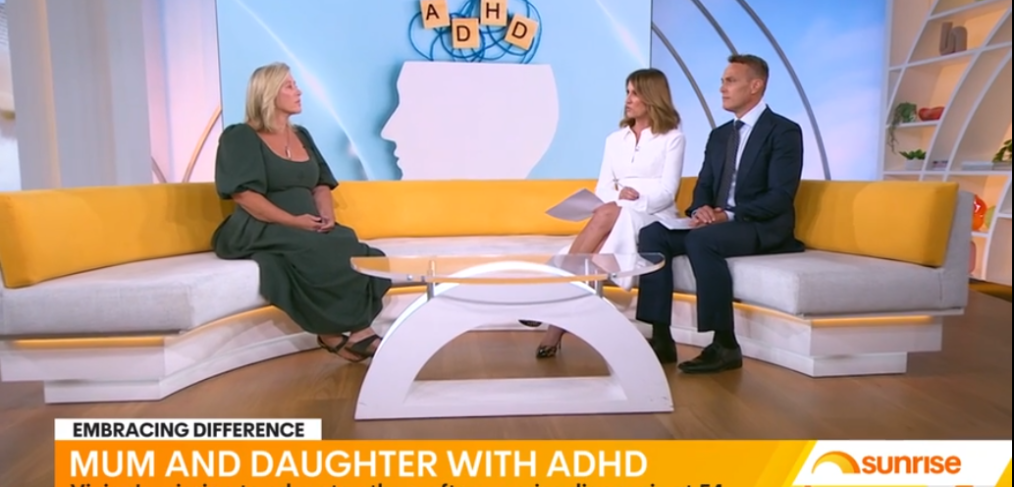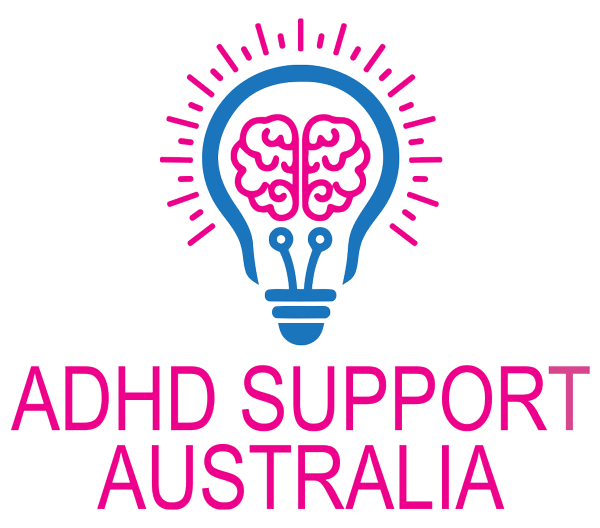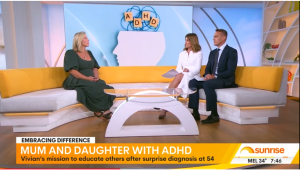
Late Diagnosis in Women with ADHD
I’m incredibly grateful for the opportunity to speak on Channel 7’s Sunrise this morning about late-diagnosed ADHD in women.
While I didn’t get to cover everything, I appreciate the chance to start the conversation and raise awareness. There’s so much more to discuss, so I’m sharing my full thoughts here for those who want to dive deeper…
You can view the interview here.
The Overlooked Signs of ADHD in Women
Many women, like myself, are only diagnosed with ADHD later in life. But why does this happen, and what are the key signs that get missed?
Lack of awareness about adult ADHD
A common pathway for late diagnosis in women is how I was eventually diagnosed – that your child is diagnosed, and you start to wonder about your own symptoms and then maybe seek a diagnosis.
Many people don’t even realise that adult ADHD exists! Until relatively recently adult ADHD was not recognised. It was thought that the children diagnosed somehow just grew out of it when they reached adulthood! In fact, the taxi driver on my way home from the studios this morning, said just that – ‘I thought that was something only kids had’ and was interested to hear more about adult ADHD. So, the misconceptions are still very much out there!
Late diagnosis in women also starts with it being missed or misdiagnosed in girls. This happened with my daughter, who at 14, received a relatively late diagnosis of inattentive ADHD.
Women and Girls often don’t fit the stereotype
ADHD wasn’t on my radar in her early childhood, because I guess it’s one of those things you don’t really look into unless it touches your life. So, although she was experiencing difficulties at school, and had various speech & language, OT, dyslexia assessments and so on, and was seeing a psychologist for anxiety, neither teachers, nor professionals suggested she may have ADHD. It was only after chatting with a fellow parent about ADHD that I started to read up on it, realised it was a definite possibility, and then raised it with the psychologist. She referred us to psychologist specialising in ADHD and her diagnosis was confirmed.
Our experience highlights the first reason girls are under diagnosed with ADHD – that they are not exhibiting the stereotypical hyperactive or disruptive behaviours. They tend to more often, but not always, have the inattentive form of ADHD which manifests as an inability to focus on specific tasks which may appear as daydreaming or zoning out – leading others to believe they are uninterested or lazy. Girls also tend to be better at ‘masking’ their symptoms and adapting to fit in so they can avoid drawing attention to their struggles. This adaptation can unfortunately lead to increased overwhelm and anxiety.
As they grow older, their ADHD can be described as an internalised restlessness – a racing mind, overthinking or difficulty relaxing and shows up as chronic busyness, the need to always be doing something, perfectionism or anxiety – also exhausting!
Emotional Sensitivity
Often women are told they’re simply “too emotional” or diagnosed with depression instead of ADHD. But – the fact is that emotional sensitivity, or sometimes even Rejection Sensitivity Dysphoria (RSD), (an extreme response to perceived criticism, rejection or failure common in people with ADHD), can be a core part of ADHD symptoms. These symptoms can often be debilitating, leading to low self-esteem, perfectionism or avoiding challenges due to the fear of failure or of not being good enough.
The Role of Hormones
Another complicating factor is the role of female hormones. ADHD symptoms can intensify at different points in a woman’s life due to the way that oestrogen plays a role in dopamine regulation. During puberty, pregnancy, postpartum, and especially in perimenopause and menopause when estrogen levels fluctuate even more. Some women even experience PMDD (Premenstrual Dysphoric Disorder), a debilitating condition linked to their hormonal shifts. This topic will be discussed in our March 2025 expert talk with Kylie Smart, a degree-qualified naturopath with an evidence-based approach. We will explore how various factors interact and influence mood, focus, and overall well-being.
High-achieving women can have ADHD!
Despite understanding ADHD so well, it took me years to seek my own diagnosis. Many intelligent, high-achieving women or girls, assume, as I did, that their struggles are due to low mood, depression or personal shortcomings rather than an underlying neurodevelopmental condition.
Misdiagnosis
Yet another reason women fall through the cracks is that anxiety and depression are common co-morbidities of ADHD, and often come along with it. Women are often misdiagnosed with one or both of them, rather than with ADHD itself. The ADHD can be at the root of the anxiety and depression because the overwhelm, chronic stress, and emotional dysregulation associated with ADHD can lead to feelings of inadequacy, burnout, and exhaustion. Unfortunately, treating only the secondary conditions, without addressing the ADHD leaves many women feeling stuck.
Procrastination and putting yourself last!
In typical ADHD style, I got the referral to the psychiatrist from my GP but procrastinated about booking the appointment for so long that when I finally made the call, they said it had been over a year and I needed a new referral – back to the GP I went!
How has ADHD Impacted my life?
Childhood signs of ADHD
Looking back, I now see the signs of ADHD in my childhood! From trying to replicate Olympic gymnasts in my hallway and crashing through the glass front door at home, to being told off for talking too much in class, school reports stating: ‘could do better if she stopped talking and focused’, the chronic lateness to anything and everything, the constant procrastination and putting off tasks until the last possible minute, pulling all-nighters to finish assignments and pressing submit in a panic at 11:59pm EVERY time!
How ADHD Shows Up for me as an adult
As an adult, ADHD shows up in my life in ways people don’t see and those without ADHD don’t understand. While I may appear the confident and capable Founder of ADHD Support Australia, people see the outward success but fail to see the hidden struggles with depression, low mood, low self-confidence, perfectionism, self-doubt and motivation.
Hyperfocus
Hyperfocus – an ADHD trait where we can become completely absorbed in topics we’re passionate about – sometimes losing all track of time – this can be a positive – and I would say that it has driven my dedication to ADHD Support Australia and to helping others navigate their ADHD journey with more support than I had.
But on the flip-side, this hyperfocus can lead to unhealthy habits. Working from home, for myself, without a structure has led to working too many hours and pushing out other healthy aspects from my life such as regular exercise, keeping up with friends, good nutritional choices and getting enough sleep. These are areas that I need to pay careful attention to – but it can vary for everyone.
Addiction
Women (or anyone) with ADHD are more prone to addictions. Whether that be digital media, drugs and alcohol, gambling, food, shopping or work! For me I think work has been my addiction – fuelled by the desire to know everything – perfectionism, proving myself to be worthy and the dopamine hits from successfully helping others!
Not asking for help
Because women with ADHD often feel it’s their fault, they very often fail to ask anyone else for help – feeling that they should be able to manage things themselves. This ultimately leads to a place of overwhelm and burn out.
Overwhelmed by life
ADHD for me looks like struggling to manage my time effectively and feel productive, leaving tasks until the last minute, suffering the stress of chronic lateness, constantly playing catch-up and ALWAYS feeling like I need to “get my life together.” I feel like each day I say ‘today is the day I will get on top of things’ but that day never happens no matter how much I actually achieve in a day.
All these things lead to a feeling of frustration with myself and, rarely feeling truly capable or good enough. It’s quite exhausting trying to be a perfect, more organised version of myself!
I hear from so many women who feel the same—successful on the outside but constantly overwhelmed and exhausted on the inside. ADHD can be a hidden struggle, and while more people are talking about it now, the reality is that many women are still falling through the cracks. Just this week I received an email from someone saying that to the outside world it appeared they had a successful career as a lawyer, but outside of work their life was chaotic and they struggled with their emotions and addiction. After much heartache, they finally found that they had undiagnosed ADHD and are with this knowledge has come the ability to start getting their life on track.
So, whilst it’s important to acknowledge women with ADHD can be successful in many areas of their lives, including the difficult, but oh so important job of raising a family (especially when their children are neurodivergent), we also have to acknowledge the challenges they face in other areas too.
High Profile Women with ADHD
A few high-profile women and celebrities are opening up with honesty about how their ADHD impacts them recently, which is fantastic for breaking the stigma and raising awareness.
There are, however, a rash of online people talking about their ADHD – also great for awareness. We do also need to be careful – there’s a real difference between having ADHD and just feeling scattered, overwhelmed or having difficulty focussing. When everyone claims to have ADHD, it can take away from the real struggles of those with a true diagnosis.
Getting a diagnosis
In order to have a diagnosis of adult ADHD you need to have experienced the symptoms as a as a child under 12 years old as well. It can’t be something that has just started in your adult life – that could be a symptom of something else. It’s often useful to ask parents, close family or friends about your childhood and dig out any old school reports if possible to confirm your recollection. See my website for more information
If you think you might have ADHD, the first step is to visit your GP. Hopefully one that understands ADHD and get a referral to a psychiatrist and it’s important that they specialise in ADHD. You can also get diagnosed by specialist psychologists but if you want to access medication for ADHD you will still need to see a psychiatrist.
Finding a professional
At the moment, unfortunately there is a huge shortage of psychiatrists specialising in ADHD, the wait lists can be long and often the costs are relatively high – which makes it difficult for those that don’t have the money to access the assessment process. I have a directory of professionals on my website at ADHD Support Australia so you can start there if you’re looking for a professional or ask your GP or someone you know for a recommendation.
Navigating Life After an ADHD Diagnosis
Receiving a diagnosis can be life-changing. It helps you release the guilt and self-blame, realizing that your brain is wired differently—it’s not a personal failure.
If you receive a diagnosis, you will likely be offered medication to trial if you want to. This can be life-changing for some, but it is not a 100% silver bullet – many women find that a combination of ADHD coaching, lifestyle changes and building a strong support network makes a world of difference.
What if it’s not ADHD?
Your professional may not diagnose ADHD. They will guide you on what is going on for you, but if you don’t receive a diagnosis of ADHD, but you feel you do have symptoms, you can still see non-medical support to help
Solutions
Everyone with ADHD is unique so what works for one won’t work for another, but the symptoms of ADHD can often be significantly improved through ADHD coaching, parent coaching (for parents), lifestyle strategies such as improving sleep, exercise, nutrition, stress management, and building the right support systems, including if necessary a mental health team. These things can all make a huge difference.
Knowledge is Power
Find out as much as you can about your ADHD and what might be able to help you. My Patreon has snippets on tips, strategies, and personal insights to help you better understand and manage ADHD
Find support
Support is crucial. Helping your family, friends and support network to understand you and enlisting their support will be essential. If that’s not possible, find either localised support via a group that meets in-person or an online group.
I count myself lucky that I’ve been with my husband since I was 18 and I’ve realised that he has been a huge support to me over the years – booking things for me, helping me to get places on time, doing my accounts and much more. I couldn’t have achieved what I have without having him in my corner – so a supportive and understanding person in your life is invaluable.
Embrace who you are
The most important thing? Embrace who you are. ADHD doesn’t mean you’re broken—it just means you think differently. With the right tools and strategies, you can create a life that works for you, rather than trying to force yourself into a mould that was never designed for your brain.
You can find out more about ADHD, visit the directory of ADHD professionals, find out about our upcoming monthly expert talks and other programs at ADHD Support Australia.
The author, Vivian Dunstan, is Founder & CEO of ADHD Support Australia ADDCA trained ADHD Coach, Parent Coach & Facilitator of Parenting Children with ADHD – a 6-week online course, Certified Tech Addiction & Digital Health Educator (NIDHW) and Facilitator of the 6-week online Digital Parenting Program, Certified PEERS Social Skills for Teens & Young Adults coach and program facilitator, Certified NeuroACT provider & course facilitator, non-practicing teacher, parent of a young adult with ADHD and has ADHD herself.

